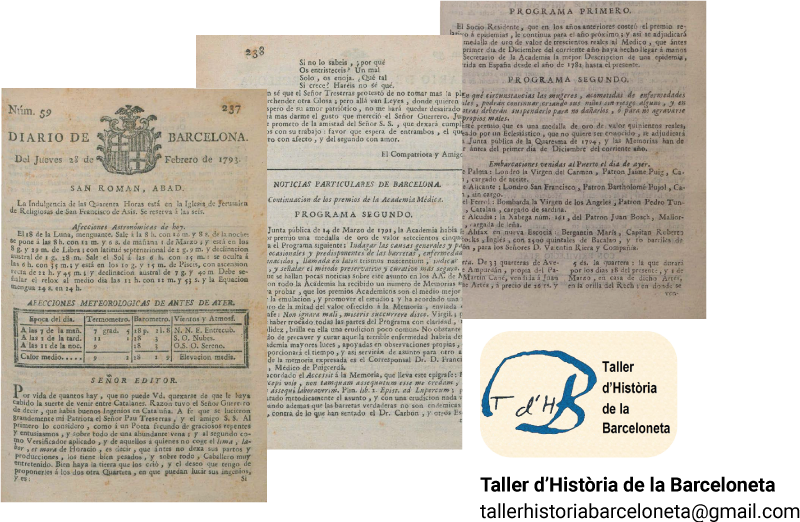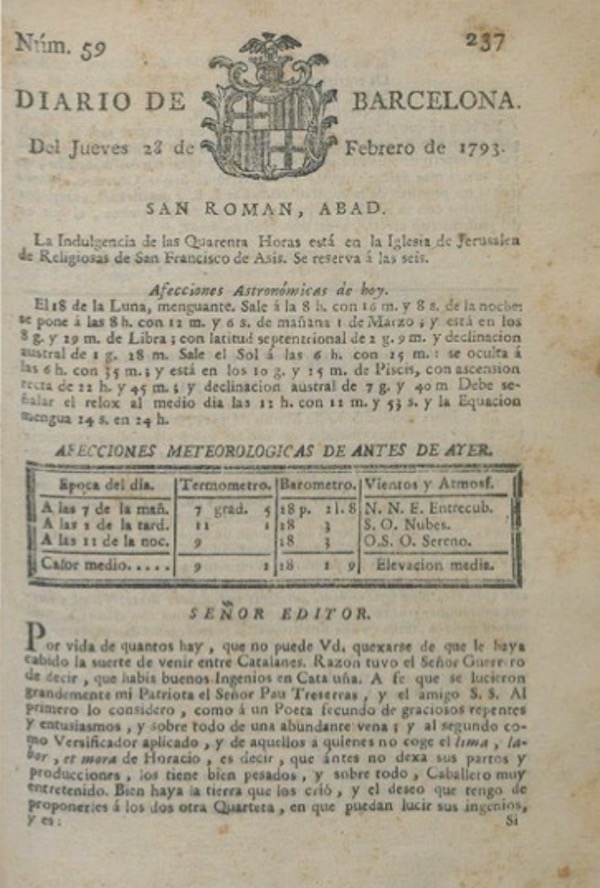
The first announcements in the neighbourhood
“Good quality leeches are available”
Since its beginnings in 1753, Barceloneta has been an active neighbourhood full of anecdotes and curiosities. Its links with the main commercial centre and gateway to the city, the Port, conditioned both the type of residents who settled here and the activity that took place there. A combination that makes Barceloneta a truly different neighbourhood. The selection of advertisements that we show you here already demonstrate this singularity.
Everyone needed to sell, rent, buy, give or exchange something.
In the first years of the neighbourhood’s formation, the population that settled there was made up of people of very different nationalities and trades, from sailors, tradesmen and craftsmen to soldiers and, of course, fishermen. What a “fun” cocktail!
The merchants used the ground floor of the houses as workshops or shops of all kinds. There was a proliferation of cafés, taverns, small hotels and guesthouses and a series of establishments and services necessary for people of different origins who had just arrived and were settling down or were just passing through.
If we think that these were previously unknown people who had to communicate what they did, offered or needed, it is easy to guess that they had to make themselves known. Or what we now call advertise.
Lemons from Malaga, olives from Seville or a deer!
Among the advertisements found, we’ve selected some quite representative and curious ones.
For example, at the end of the 18th century, the Stirling family (clearly of foreign origin) had a food and drink business opposite La Riba. On the 11th of October 1792, they used the Barcelona Gazette to publish their offer of lemons from Malaga and olives from Seville. Both retail and wholesale.
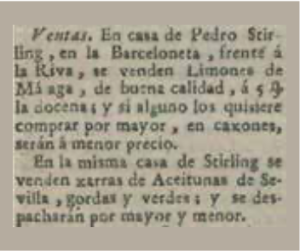
Francisco Naranja, a resident of Seville Street, a seller of all kinds of animals, advertised the sale of a deer on the 10th of October 1794. What happened to the deer? A good question.
Cash in now or never.
But possibly the one that has most caught our attention is that of Joan Casanovas, alias “el Sardo”, a mule rentee. On the 16th of April 1796, Mr Joan announced his imminent death in El Diario de Barcelona. El Sardo, with a surprising sincerity and serenity that does him credit, warns – and thanks – his creditors or debtors to collect or satisfy their debts before his imminent death. Undoubtedly, not only did Sardo want to die in peace with God, but also in peace with the world..
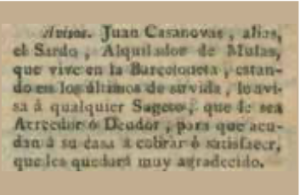
The first sausages.
At this time, the location of the place of sale was approximate. Not every street had a name and not every house had a number. But everyone knew each other or knew where you could find the seller.
The Diario de Barcelona reported on the 3rd of February 1824 that four Bolognese (natives of Bologna) who made sausages and offered to work for others in their production had arrived in Barceloneta. They could be found at La Posada de la Paloma, located in Plaça de la Font. Curiously enough, where the Mercat with its corresponding charcuteries is nowadays.
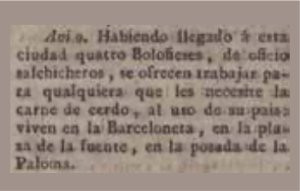
Good quality leeches
If we are talking about health, Josep Borrell’s pharmacy was at number 5, Carrer Sant Miquel. On the 3rd of February 1824, the apothecary published in El Diari de Barcelona that he had good quality leeches, and if Borrell the pharmacist prescribed them, there was no reason to object to it.
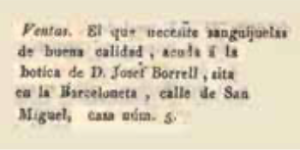
We not only find advertisements for the sale of products, but also institutional notices such as the one published in El Diario de Barcelona on the 25th of July 1827, announcing the auction of the lease of the service to bring and sell snow in the neighbourhood for 5 years.
Girl to serve or breastfeed.
It is worth mentioning a type of advertisement offering the services of women and girls, even of a young age, for different tasks. Mainly for what was popularly known as serving or attending to the housework of a family, normally of better
position. Even in El Diario de Barcelona of the 8th of April 1796, a young woman offered herself as a wet nurse to breastfeed a newborn baby “with her two-month-old milk”.
In all these cases, it was the men who gave references about them, acting as tutors.
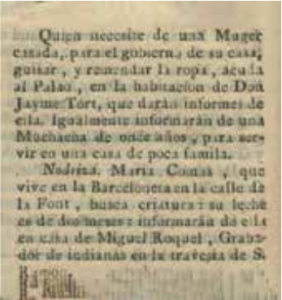
One bath 6 reales, 10 baths 50 reales.
On the 2nd of June 1824, an advertisement for the Can Soler baths was published. A very complete service with a multitude of options: sea water or ordinary water, cold or lukewarm… but always with clothes. Although Mr. Soler’s astute man was already promoting the subscription of 10 baths
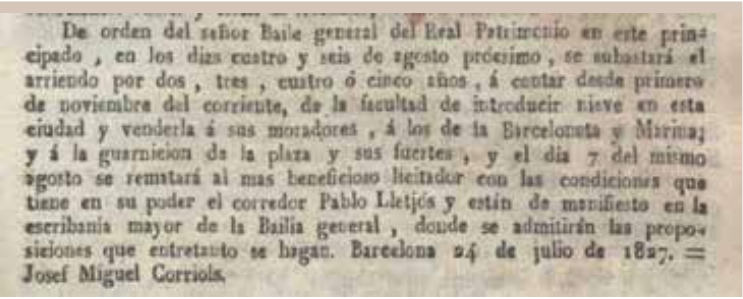
The newspapers of the 18th century.
When the first paper newspapers began to appear, they were weekly and consisted of one or two pages at the most. Much of the news was focused on local social issues, politics, culture and, as we have mentioned, port activity.
Some of the most important titles were La Gaceta de Barcelona, El Correo Nacional, El Diari de Barcelona or Brusi, El Diluvio, El Diari Català, La Vanguardia or El Noticiero Universal, among many others that were short-lived or very specific in cultural and literary issues, especially in the field of culture and literature.
